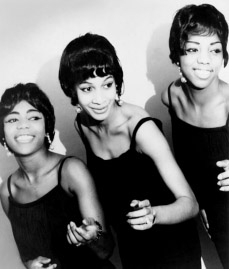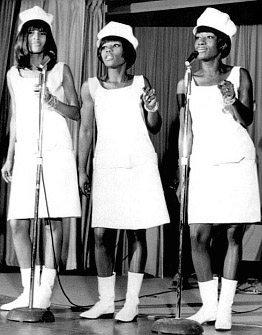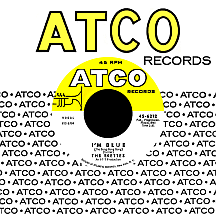THE IKETTES
I'm Blue (The Gong-Gong Song)
Bandleader, piano player, guitarist and entrepreneur Ike Turner had a wary outlook on life in general and, more specifically, the ins of outs of the music business. Corporate comings and goings...or a more independent, wheeling and dealing mindset? He sometimes chose the former but preferred the latter. His discovery of Tina Turner in 1958 evolved into the most successful of his many endeavors; a dynamic, unwavering performance style made Tina a frontwoman for the act that billed him first and her (the main attraction) second. Later, his name appeared twice on marquees, after being struck by the idea of naming his female backing singers The Ikettes and (much like Ray Charles' group The Raeletts) promoting them, part of the time, as a separate act.
The group's first unofficial members were "loaned" to him by Art Lassiter, a singer Ike knew from his time in St. Louis, where Tina had also lived. Lassiter, with two late-'50s singles on the Ballad label to his credit, had christened his own backing trio The Artettes (it appears there was no limit to the number of Charles' imitators); Robbie Montgomery, Sandra Harding and Frances Hodges functioned as unnamed background singers, and very good ones, on "A Fool in Love" (the hit that established Ike and Tina in the fall of 1960) as well as the Sue Records follow-ups "A Fool Too Long," "I Idolize You" and "I'm Jealous." The three considered themselves nothing more than vocalists-for-hire (they had a certain degree of loyalty to Lassiter), session singers that made a handful of appearances with Ike's troupe before making their departure.
This was when Ike decided to hire singers he could control, who would contribute to the act in any way deemed necessary, could keep up with the fabulous Miss Tina and, perhaps, become stars in their own right as the Ikettes. He'd written and produced a single by Eloise Carter (birth name: Eloise Hester), "I Need You," released on Sue in the spring of '61. Eloise was joined by Jo Armstead, a Mississippi-born ball of fire with an assertive desire to be a singer-songwriter. Texan Delores Johnson (who also waxed "Give Me Your Love," a Turner-produced solo effort on the Bobbin label) became the designated lead singer and the trio, with assistance at the sessions from Tina, recorded an upbeat rendition of Ike's downer-concept "I'm Blue (The Gong-Gong Song)," those funky 'gongs' a key part of the hook. Issued on Atco late in '61, it spent several weeks in the pop top 20 and R&B top ten of February and March 1962.

There were three other Atco singles. Solid (but formulaic) "Troubles on My Mind," sugary "Heavenly Love" and Big Easy-esque "I Had a Dream the Other Night" couldn't replicate the pulsating rapture of "I'm Blue" and by late in the year the trio had gradually drifted away. Delores was the first to leave, emerging with a 45 on Carnival, "What Kind of Man Are You." Jo did New York session work while cutting a series of solo records for De-Lex, Infinity and other small labels, using the names Jossie, Joshie and/or Joshie Jo Armstead. Later, she formed a songwriting trio with Nick Ashford and Valerie Simpson, supplying minor chart hits for Tina Britt, Maxine Brown, The Shirelles, Aretha Franklin, Ray Charles and even soul man-turned-future country star Ronnie Milsap.
Ike got busy building another lineup of Ikettes; Robbie Montgomery (an ex-Artette by that time) was given lead billing on a late-'62 single that spelled the group's name Ike-ettes (even the name of the label, Teena, was curiously askew); the failure of "Crazy in Love" owes mainly to its cut-and-dried imitation of "A Fool in Love." One other Teena disc, "Prisoner in Love" (changed afterwards to "No Bail in This Jail (Prisoner in Love)"), was more attention-grabbing, with Tina's hysterical crying, laughing and screaming offsetting the trio's vocals; it teetered on the lowest ledge of the national charts in May 1963. This incarnation included Montgomery, Jessie Smith and Venetta Fields (she took a shot at solo success with "You're Still My Baby" on Ike's Sony label, which he changed to Sonja after the one release). These three remained longer than any others...and stayed together as former Ikettes for years afterwards.
Singers were interchangeable as far as Ike was concerned. While these three felt right, they were simply one subset (along with his band, The Kings of Rhythm) that existed to enhance (but not overshadow) the dynamic front-and-center star. The plan was to integrate the Ikettes with Tina, the vocals and dance moves serving to electrify audiences. When that goal was achieved, The Ike and Tina Turner Revue stood head and shoulders above its competition (save for obvious exceptions like Ray Charles' or James Brown's shows). A single on Innis Records, "Here's Your Heart," credited The Ikettes with Ike and Tina Revue; a no-nonsense breakup song (with fuzz guitar!), it nevertheless failed to gain any traction. Ike kept trying any trick that might result in a hit; at about this same time, he cut a slow-groove duet for Innis, "You Can't Have Your Cake and Eat it Too," with former Ikette Delores as Ike and Dee Dee Johnson.
A contract with Turner's previous business partners The Bihari Brothers performed above expectations. The agreement placed Ike and Tina on their Kent label and the Ikettes on Modern from 1964 through '66. Late-'64's "Camel Walk" (oddly misspelled "Iketts" on the label) was a good start, picking up airplay on a handful of stations and coming across as a quirky dance routine on the live shows. Jessie took lead vocalist duties on the wildly infectious Steve Venet-Tommy Boyce track "Peaches 'n' Cream" ('...ah! ah! ah! peaches...'), their most popular radio track since "The Gong-Gong Song," with a top 40 peak in April 1965. The group's spotlight time during Revue shows increased as subsequent singles ("(He's Gonna Be) Fine, Fine, Fine," "I'm So Thankful" and "(Never More) Lonely For You") became hits, to various degrees, on pop and R&B stations, particularly in certain eastern cities (they loved them in Hartford and Cleveland!). In November 1965, the Turner Revue made a sensational appearance as the closing act on the Phil Spector-produced Big TNT Show, which played in theaters two months later. A new trio of Ikettes (Gloria Scott, Maxine Smith and P.P. Arnold) joined them onstage, while Modern singles by the previous trio were still making the rounds. Yet these rookie members had what it took to go toe-to-toe with Tina Turner!

So what happened to Jessie, Robbie and Venetta? Feeling confident in their abilities and certain they deserved more than just the meager live performance fees Ike was paying them (often in hundred dollar bills), they left to sign their own contract with the L.A.-based Mirwood label as a house group of sorts, The Mirettes (still functioning as "-ettes" in an industry controlled by men, though monetarily this setup worked more in their favor). From Ike's point of view their leaving wasn't an issue, if only because of the timing; the TNT Show led to a series of sessions produced by Spector, who had no use for Ike (or his singers) in the studio. Phil had a crew he was already comfortable with; he really only needed Tina. Ike had no objection as long as several of Spector's high-denomination greenbacks greased the palms of his hands. But the newest Ikettes did have one session with Spector before they moved on; "Down, Down" backed with "What'cha Gonna Do (When I Leave You)" (both written by Ike) was issued that summer on the Phi-Dan label.
At times Ike's girl group numbered four; some of the better-known participants were Paulette Parker (later known as Maxayn Lewis), Ann Thomas, Jean Brown and one of the longer-lasting members, Pat Powdrill. Others included Patrice Holloway and her sister, moonlighting Motown star Brenda Holloway, both briefly associated with the group, as was Bonnie O'Farrell (in her role as the "first white Ikette," the blonde singer wore a brunette wig and applied tanning oil to make her skin appear darker onstage). She was with them a short time before forming a duo (on records and in marriage) with Delaney Bramlett; as Delaney and Bonnie and Friends (frequently teaming with well-known recording acts), they scored several hit singles between 1970 and '72. In the late '60s and early '70s, the Ikettes primarily backed the Revue onstage and were only featured on records credited to Ike and Tina Turner and the Ikettes.
After two 1966 releases on Mirwood ("He's All Right With Me" and "Now That I Found You, Baby"), the Mirettes (Jessie, Robbie and Venetta throughout the group's existence) signed with the ironically-named Revue label (a division of MCA) and scored with a remake of Wilson Pickett's "In the Midnight Hour," a top 50 pop and top 20 R&B hit in early 1968. After three more on Revue, they were transferred to MCA's Uni label for four additional 45s including "Sweet Soul Sister," a collaboration with Nate Turner (no relation to Ike). In 1970, "Ain't My Stuff Good Enough?" on Zea wrapped things up for the Mirettes.
The Ikettes finally had a couple of singles of their own in 1971 and '72 (including the Tina-penned "Got What it Takes (To Get What I Want)") on United Artists, the last record company Ike and Tina recorded for. Prior to the inevitable Turner breakup of 1976 and subsequent divorce, another dozen or more singers populated the backing group. One of these, Claudia Lennear, peaked post-Ikettes in the early '70s as she recorded for A&M and Warner Bros. and provided vocal enhancement for a number of high-profile British stars (among them The Rolling Stones, Joe Cocker, George Harrison and Elton John).
Ike continued recruiting young female singers long after he and Tina had gone their separate ways. The advantage for the many Ikettes came in the form of gaining exposure touring with the Revue or his later bands, making records with the group and occasionally as solo artists, and experiencing the thrill of becoming professional singers. But there were distinct disadvantages: overworked and underpaid, often victims of Ike's whims, they couldn't always count on Tina Turner to intervene; the great lady had her own issues with bossman/husband Ike Turner...until 1976, anyway. Where The Ikettes were concerned, he called all the shots. Some were able to deal with it longer than others.


